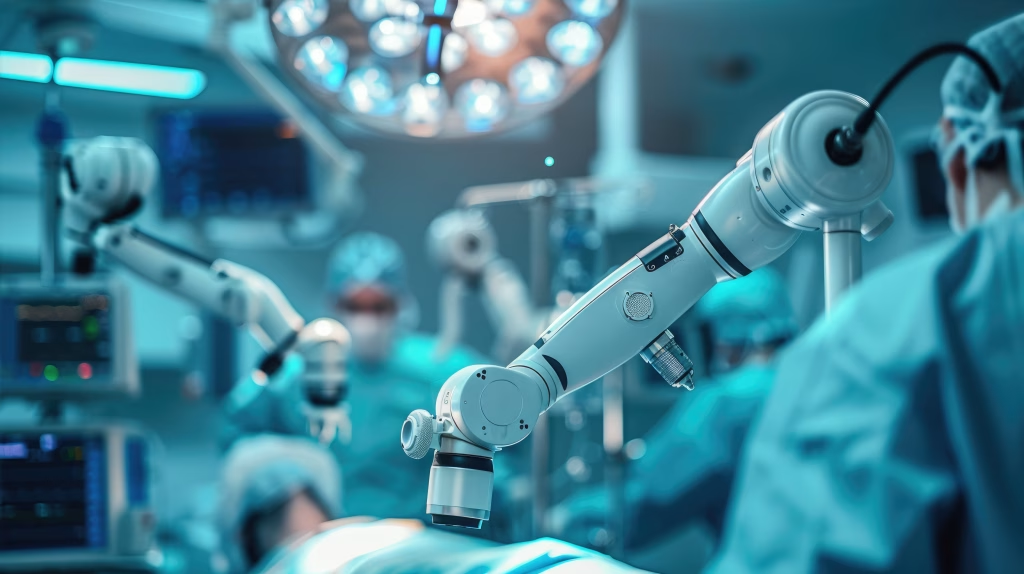
Imagine a world where surgeries are faster, safer, and almost flawless. Every cut, movement, and decision in the operating room is guided by intelligence. That world has arrived, thanks to artificial intelligence.
Surgery has always required skill, dedication, and experience. However, even the best surgeons have human limits, that might have an impact on results. AI is changing this by serving as a silent partner, assessing data, predicting risks and guiding hands with robotic precision.
In this blog, we will explore how AI is enhancing every stage of surgery. We’ll also highlight real-world examples, the benefits of AI-guided surgery, and how Medrays is helping healthcare providers embrace this revolutionary technology.
The Challenge of Traditional Surgery
Traditional surgery is primarily dependent on human ability, experience, and judgment. While surgeons are highly trained professionals, human limitations such as fatigue, stress, and limited visibility can affect outcomes. Complex procedures like neurosurgery or orthopedic joint replacements require millimeter-level precision. Mistakes, even small ones, can lead to complications, longer recovery times, or additional procedures.
This is where AI steps in as a strong partner.
How AI Enhances Surgical Accuracy
AI in surgery works in several ways:
- Pre-operative Planning
Before making a single incision, algorithms may analyze patient data, such as imaging scans and test results, to create highly detailed surgical plans. These algorithms predict potential obstacles and plan appropriate surgical strategies. For example, in orthopedic surgery, AI may simulate bone structures to guide precise joint replacements, eliminating human error.
- Robotic Assistance in the OR
Robotic surgical systems powered by AI act as extensions of the surgeon’s hands. These devices convert the surgeon’s gestures into precise actions, reducing tremors and unintentional movements. In delicate procedures such as cardiac surgery, AI-guided robots ensure that equipment follows precise paths, thereby boosting safety and outcomes.
- Real-time Decision Support
AI helps surgeons not only before surgery, but also during it. Algorithms can monitor vital signs, track surgical tools, and send real-time notifications when deviations occur. This continual feedback enables surgeons to rapidly modify procedures, avoiding issues before they occur.
- Post-operative Insights
AI continues to provide usefulness after surgery. By evaluating intraoperative data and patient recovery trends, algorithms can predict issues such as infections or delayed healing. Surgeons and care teams can then modify post-operative care to reduce recovery time and improve patient outcomes.
Real-World Impact
Orthopedics: AI-assisted robots ensure that joint implants are correctly placed, minimizing the need for alterations.
Neurosurgery: Artificial intelligence maps complicated brain structures in 3D, allowing surgeons to navigate safely around critical areas.
Benefits Beyond Precision
- Reduced Risk of Complication: Continuous monitoring and predictive alerts help to prevent surgical errors before they occur.
- Shorter Recovery Times: Accurate operations reduce tissue damage, which accelerates patient recovery.
- Increased Efficiency: Optimized workflows and robotic assistance shorten operation times and lower operating room stress.
- Enhanced Training: Surgeons can utilize AI simulations to rehearse complex procedures without putting patients at danger, which improves skill development.
Challenges of AI-Guided Surgery
While AI is transforming surgery, its adoption comes with real-world challenges that hospitals and surgical teams must address:
- Data Quality and Availability:
AI’s accuracy is totally dependent on the quality of the data it learns from. Incomplete, inconsistent, or poorly annotated medical data can result in unreliable predictions.
- Integration of Existing Workflows:
Introducing AI into an operating room is more than just installing software. Surgeons and staff must adapt to new tools while maintaining efficiency. Seamless integration is essential—AI should compliment human talent rather than interrupt productivity.
- Training and Adaptation:
Surgeons and OR staff need training to effectively use AI tools. Understanding AI recommendations, interpreting alerts, and trusting the system’s insights require both technical knowledge and confidence. Proper training ensures that AI acts as a supportive partner, enhancing decisions rather than creating confusion.
- Cost and Accessibility:
Advanced AI systems and robotic surgery tools involve significant investment. Smaller hospitals may face budget constraints or lack technical infrastructure.
- Trust in Technology:
Even with proven accuracy, human skepticism can slow adoption. Surgeons may hesitate to rely on AI insights without seeing consistent results. Building trust requires evidence, training, and gradual implementation.
The Future of AI in Surgery
The future points to even greater AI integration. Imagine autonomous surgical assistants, predictive simulations for complex procedures, and algorithms that anticipate complications before patients even enter the operating room. With Medrays at the forefront, these possibilities are becoming reality today.
Wrap it Up
AI-guided surgery is more than just technology; it is about redefining patient care. By integrating human skills with intelligent systems, we can achieve outcomes once considered impossible.
This AI powered surgery is revolutionizing operating rooms, making procedures safer, faster, and more accurate. However, any intelligent algorithm requires one key component: high-quality medical data. Accurate, properly labeled data enables AI models to detect dangers, drive robotic accuracy, and offer consistent results.
Medrays provides highly curated and annotated medical data which serve as the foundation for AI-driven surgical solutions. By integrating our data knowledge with modern AI tools, we enable surgeons to make educated decisions, enhance patient outcomes, and confidently face the future of precision surgery.
The quality of the data that powers artificial intelligence in surgery is just as important as the technology itself. With Medrays in the leading edge, hospitals and clinicians acquire the knowledge they require to revolutionize surgical treatment.
